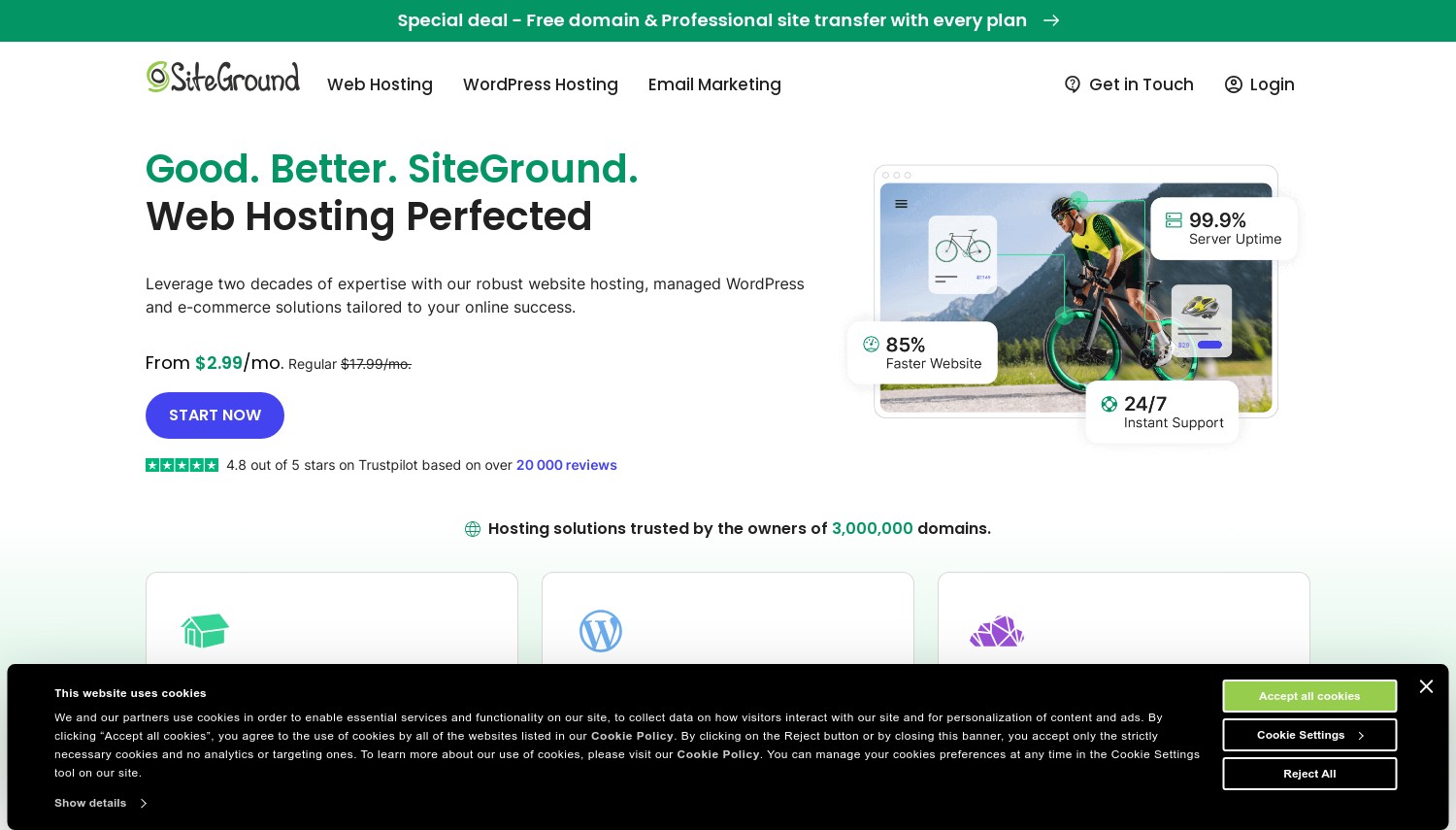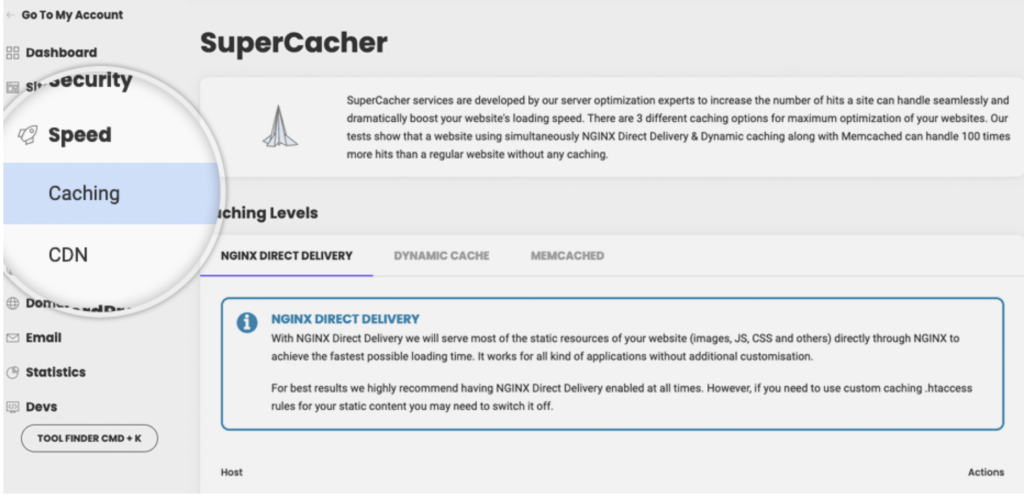SiteGround VS BlueHost – Compare + 38K Reviews
This article dives deep into a detailed comparison of SiteGround versus Bluehost, focusing on key aspects such as pricing strategies, performance metrics, and customer support efficiency, to help you make an informed decision.
Full features comparison
 SiteGround
SiteGround
1. SiteGround


 24.4k+
24.4k+
 Positive
Positive

| Space | Bandwidth | Panel | Price | |
|---|---|---|---|---|
| 10 GB | Unlimited | cPanel | $3.41 | View Plan |
| 20 GB | Unlimited | cPanel | $5.69 | View Plan |
| 40 GB | Unlimited | cPanel | $9.11 | View Plan |
| Space | CPU | RAM | Bandwidth | Price | |
|---|---|---|---|---|---|
| 40 GB | 4 cores | 8 GB | 5 TB | $91.24 | View Plan |
| 80 GB | 8 cores | 12 GB | 5 TB | $182.47 | View Plan |
| 120 GB | 12 cores | 16 GB | 5 TB | $273.71 | View Plan |
| 160 GB | 16 cores | 20 GB | 5 TB | $364.94 | View Plan |
| Space | Bandwidth | Panel | Price | |
|---|---|---|---|---|
| 20 GB | Unlimited | cPanel | $7.97 | View Plan |
| 40 GB | Unlimited | cPanel | $15.95 | View Plan |
| 40 GB | Unlimited | cPanel | $91.24 | View Plan |
 BlueHost
BlueHost
1. Bluehost


 24.7k+
24.7k+
 Neutral
Neutral

| Space | Bandwidth | Panel | Price | |
|---|---|---|---|---|
| 10 GB | Unlimited | cPanel | $2.95 | View Plan |
| 50 GB | Unlimited | cPanel | $5.45 | View Plan |
| 50 GB | Unlimited | cPanel | $9.95 | View Plan |
| 100 GB | Unlimited | cPanel | $13.95 | View Plan |
| Space | CPU | Price | RAM | |
|---|---|---|---|---|
| 10 GB | N/A | $2.95 | View Plan | |
| 120 GB | 2 cores | 2 GB | $31.99 | View Plan |
| 165 GB | 2 cores | 4 GB | $41.99 | View Plan |
| 240 GB | 4 cores | 8 GB | $71.99 | View Plan |
| Space | CPU | RAM | Price | |
|---|---|---|---|---|
| 1 TB | 4 x 2.3GHz | 8 GB | $91.98 | View Plan |
| 2 TB | 4 x 2.5GHz | 16 GB | $121.88 | View Plan |
| 2 TB | 4 x 3.3GHz | 30 GB | $141.99 | View Plan |
| Space | CPU | Bandwidth | Price | |
|---|---|---|---|---|
| 10 GB | 2 cores | Unlimited | $29.99 | View Plan |
| 125 GB | 4 cores | Unlimited | $49.99 | View Plan |
| 175 GB | 75 cores | Unlimited | $89.99 | View Plan |
| Space | Bandwidth | Price | |
|---|---|---|---|
| 10 GB | Unlimited | $2.95 | View Plan |
| 40 GB | Unlimited | $5.45 | View Plan |
| 40 GB | Unlimited | $9.95 | View Plan |
| Warranty | Price |
|---|
| Space | Bandwidth | Warranty | Price |
|---|
| Space | CPU | Warranty | Price |
|---|
Overall Scores
 SiteGround
SiteGroundReview Score
Customer Support
 BlueHost
BlueHostReview Score
Customer Support
Comprehensive Comparison: SiteGround vs Bluehost in 2025
Choosing the right hosting platform between SiteGround and Bluehost in 2025 can seem like a tough decision, given both of their reputations for excellence.

This comprehensive comparison aims to demystify the choice, presenting clear and simple facts to guide you through deciding the best option for your website needs.
Pricing Strategies: SiteGround vs Bluehost
When evaluating web hosting options, understanding the pricing strategy employed by providers like SiteGround and Bluehost is crucial. Both companies offer competitive pricing, but their strategies vary, catering to different user needs and long-term financial planning for website hosting.

SiteGround and Bluehost both utilize promotional pricing to attract new customers. This approach allows users to enjoy lower prices during their initial billing cycle, which often spans a year if the full amount is paid upfront. However, once this honeymoon period is over, users must prepare for a significant price increase upon renewal. Recognizing this pattern is key to setting accurate budget expectations for your website over time.
Comparatively, Bluehost maintains a lower price point than SiteGround, both during the promotional period and at renewal. This makes Bluehost an attractive option for those prioritizing budget. However, it's important to consider the comprehensive value provided by each host, including performance, support, and additional features, before making a decision based solely on cost.

Breaking Down Pricing Plans
- Promotional Pricing: Both SiteGround and Bluehost offer attractive introductory prices. For example, Bluehost's entry-level plan might begin at a lower price point than SiteGround's corresponding plan during the initial term.
- Renewal Rates: After the promotional period, prices increase. SiteGround's renewal rates for shared hosting might appear steep compared to the original price, but Bluehost also sees a significant rise in costs upon renewal.
- Plan Features: Beyond the price, each plan includes various features. Bluehost offers more storage in its basic plan, whereas SiteGround includes advanced features like daily backups and caching even in its starter plan.
Analyzing these aspects shows how each host aims to balance appeal with affordability, tailoring their offerings to different segments of the market.
Hidden Costs and Value for Money
Unveiling the true cost of hosting goes beyond just the listed price on a website. Here's how hidden fees and value propositions play into choosing between SiteGround and Bluehost:
- Domain Names: Both hosting providers offer a free domain name for the first year, but renewal rates apply after that. This cost, often overlooked at signup, should be factored into the total cost of ownership.
- Additional Services: Features like enhanced security, site migration, and premium support come at an extra cost with both providers. Depending on your technical competence and needs, these services might significantly impact your budget.
- Long-Term Contracts: To secure the best promotional price, you might need to commit to a multi-year hosting plan. This long-term financial commitment can also be seen as a hidden cost if not carefully considered.
Value for money extends beyond the dollar amount paid. It includes assessing the quality of service, available resources, and the potential for growth. For instance, SiteGround's higher pricing is reflective of their robust performance and support, making them a worthwhile investment for businesses prioritizing these aspects. On the other hand, Bluehost's affordable plans offer substantial initial savings, suitable for individual users or small projects where budget constraints are a significant consideration.
While Bluehost might win the battle on price alone, the true value derived from a hosting provider should also weigh heavily on features, performance, and the ability to scale, all of which are pivotal in the long-term success of any website.
Performance Metrics: SiteGround vs Bluehost
When selecting a web hosting service, understanding the performance metrics of potential providers is crucial. A comparison between SiteGround and Bluehost reveals significant differences in their performance capabilities, which can greatly affect your website's functionality and user experience. Performance metrics primarily encompass factors like load time, speed test results, stability, and uptime. These metrics offer a glimpse into the potential reliability and efficiency of hosting services, impacting everything from your website's SEO to its ability to retain visitors.
Load Time and Speed Test Results
Speed is a critical factor for website success, influencing both user satisfaction and search engine rankings. In tests comparing SiteGround and Bluehost, SiteGround consistently demonstrated superior speed. Websites hosted on SiteGround loaded in an average of 1.56 seconds, significantly faster than the 2.07 seconds average of sites hosted on Bluehost. This difference in load time can be attributed to SiteGround's investment in advanced speed-optimization technologies such as Nginx server-level caching and Google Cloud infrastructure, alongside their exclusive WordPress performance optimization plugin, SG Optimizer.

SiteGround's commitment to speed is further proven through stress testing, where it managed to maintain performance under pressure from high traffic, showing minimal fluctuation in response times. Speed, being of paramount importance for creating a positive user experience and enhancing SEO, places SiteGround ahead of Bluehost in this category. Furthermore, we should also mention SiteGround's SuperCacher - a proprietary caching solution designed to enhance website performance by improving loading speeds and reducing server load. It is available to SiteGround hosting users and operates in three key layers

Stability and Uptime Guarantees Compared
In addition to speed, the reliability of a hosting service is measured by its stability and uptime. Both SiteGround and Bluehost boast impressive uptime records of 99.99%, indicating that websites hosted with them are generally available and operational nearly all the time. This high level of reliability is essential for maintaining user trust and ensuring that your site is always accessible to visitors and potential customers.
While both hosting providers offer comparable uptime guarantees, the underlying infrastructure and technology stack contribute to their overall stability. SiteGround's use of Google Cloud infrastructure for all its plans enhances its resilience and scalability, ensuring that your website can handle sudden spikes in traffic without downtime. This technological edge, combined with SiteGround's proactive approach to speed and performance, makes it a strong contender for those prioritizing website reliability and user experience.
In conclusion, while both SiteGround and Bluehost offer reliable hosting solutions with strong uptime records, SiteGround takes the lead in terms of load time and overall speed. For businesses and individuals looking to optimize their online presence, these performance metrics are critical. The choice between SiteGround and Bluehost should be influenced by these factors, keeping in mind the long-term impact on your website's success.
Security Features
In today's online environment, where threats can emerge from any direction, ensuring the security of your website is more important than ever. A wide variety of tools and practices are essential in defending your digital presence from unwanted attacks, data breaches, and other forms of cyber mischief. Understanding these measures and applying them effectively to your site can provide a solid foundation for a secure, thriving online platform.
SSL Certificates, Backups, and Security Protocols
Secure Sockets Layer (SSL) certificates are foundational to website security, establishing an encrypted link between a web server and a browser. This ensures that all data passed between the web server and browsers remain private and integral. Having an SSL certificate for your site is no longer an option but a necessity, especially with the increasing importance of online privacy. It's the difference between "http://" and the more secure "https://", signaling to your visitors that their interactions with your site are secure.
Another critical aspect of website security is regular backups. In the unfortunate event of data loss due to a cyber-attack, natural disaster, or other unexpected occurrences, having up-to-date backups of your website can mean the difference between a quick recovery and a prolonged, potentially devastating downtime. SiteGround, for example, offers daily website backups, ensuring that your data is recoverable with minimal loss.
Lastly, adherence to strong security protocols, such as the use of PHP 7 by default and the implementation of a Web Application Firewall (WAF), can drastically improve your site's resilience against attacks. By blocking unwanted traffic and ensuring that your site is running on the latest, most secure versions of software, you significantly reduce the risk of vulnerabilities being exploited.
Together, SSL certificates, regular backups, and stringent security protocols form a triad of essential defenses against the myriad of threats in the online world. Implementing these measures is crucial for maintaining the integrity, accessibility, and trustworthiness of your website.
User Experience: SiteGround and Bluehost Platforms
Choosing between SiteGround and Bluehost for your web hosting needs boils down to a blend of user-friendly interfaces and efficient website management tools. Both platforms have gone to great lengths to ensure that their services cater to both tech novices and seasoned webmasters alike. From the initial setup to daily operations, users are provided with intuitive navigation and comprehensive tools to manage their online presence effectively.
Setting Up Your Website with Ease
For many, the thought of setting up a website from scratch can be overwhelming. However, both SiteGround and Bluehost have simplified this process to encourage user independence and satisfaction. When you sign up with either provider, you are guided through the website creation journey with easy-to-follow steps. This includes selecting a domain name, choosing a web hosting plan, and installing WordPress with just a few clicks. These platforms ensure that you do not need to have technical know-how to get your site up and running.
- SiteGround: New users are welcomed with tips for website setup and optimization. The guidance provided is straightforward, making it easy for beginners to have their website operational in no time.
- Bluehost: Similarly, Bluehost provides a checklist of recommended actions, such as domain selection and WordPress installation, offering a sense of accomplishment as you tick off completed tasks.
In providing these guided experiences, both hosting services eliminate the technical barriers to creating an online presence, making the process accessible and manageable for users of all skill levels.
Control Panel Usability and Access
The control panel is the heart of your website's backend, a crucial aspect for managing your online presence efficiently. SiteGround and Bluehost offer distinctly different versions of control panels, tailored to enhance user experience while providing powerful website management tools.
- SiteGround's Site Tools: A custom dashboard designed for simplicity and power. It offers a user-friendly interface equipped with essential functionalities found in traditional control panels. This innovative approach is particularly appealing to users who value streamlined operations without the clutter.
- Bluehost and cPanel: Bluehost offers a modified cPanel experience, adhering to its roots by providing a familiar platform for those accustomed to the traditional cPanel layout. However, they've made significant strides in integrating upsell pitches more seamlessly, ensuring users have access to additional tools without the interface feeling overwhelming.
While both platforms aim to simplify website management, they cater to different preferences. SiteGround is ideal for users who appreciate a modern and streamlined interface, whereas Bluehost is suitable for those who prefer the familiarity and extensive features of cPanel. Regardless of your preference, both control panels are designed with user ease in mind, offering features like FTP accounts, file management, email setup, and the ability to install SSL certificates conveniently.
In conclusion, whether you lean towards SiteGround's custom Site Tools or Bluehost's familiar cPanel, both platforms are committed to providing a user-friendly experience. They support you in managing your website's backend efficiently, even without advanced technical skills. This focus on ease of use ensures that all users, regardless of technical background, can maintain and grow their online presence effectively.
Customer Feedback: Real User Experiences Unveiled
Gathering insights from actual users offers a glimpse into the performance, reliability, and customer service quality of a service provider. This is particularly true in the hosting world, where user experiences can vary significantly from one provider to another. Let's delve into real user feedback regarding SiteGround and Bluehost to provide a clearer picture of what new users might expect.
Feedback from various platforms, including social media groups not moderated by hosting companies, provides an unfiltered view of customer satisfaction. For instance, in non-affiliated Facebook Groups such as WP Speed Matters, users openly share their experiences, both positive and negative. Such forums have become invaluable resources for gauging the general sentiment towards hosting companies like SiteGround and Bluehost.
- SiteGround Feedback: Users often highlight SiteGround's customer service as a standout feature. The company's support team is frequently praised for its responsiveness and helpfulness in resolving issues. SiteGround's performance and uptime also receive positive marks, with many users noting their website's improved reliability and loading speed after switching to SiteGround.
- Bluehost Feedback: Bluehost tends to get favorable reviews for its user-friendly interface, making it a preferred choice for beginners. However, opinions vary when it comes to customer support, with some users expressing satisfaction with the help received, while others point out areas needing improvement. The affordability of Bluehost's plans is often cited by users as a significant factor in their choice, though some have raised concerns over renewal prices and upselling practices.
Here are a few tips on interpreting user feedback:
- Look for patterns in reviews. Is there a common issue that many users note?
- Consider the context of negative feedback. Are there external factors that might have influenced the user's experience?
- Pay attention to how recent the feedback is. Companies evolve, and so does user experience.
Ultimately, choosing a hosting provider is a critical decision for any website owner. While user feedback offers valuable insights, aligning those insights with your priorities will guide you toward the best choice for your situation. Remember, the goal is to find a hosting service that not only meets your current needs but also can grow with your site over time.
The Verdict: Should You Choose SiteGround or Bluehost in 2025?
Deciding on the right hosting service for your website can feel like navigating a maze with endless turns and decisions. With 2025 fast approaching, it's crucial to make a choice that aligns with your specific needs, be it for a personal blog, a burgeoning e-commerce platform, or a professional portfolio. In the contrast between SiteGround and Bluehost, each offers compelling features - but which one is the preferable choice for you?
SiteGround has established itself as a robust solution for those who prioritize website performance and support. With its faster loading times in various tests and a reputation for stellar customer service, it stands out as a top contender. However, this heightened level of service comes at a higher price when compared to Bluehost. SiteGround's commitment to providing a managed WordPress experience translates into a smoother setup and management process for users, albeit with a cost consideration that might not appeal to all.
On the other hand, Bluehost presents an attractive offering for beginners and those looking to keep expenses low without significantly compromising on quality. Known for its user-friendly interface, it includes perks like a free domain name for the first year and email hosting, making it a compelling option for launching your first website. Additionally, Bluehost's competitive pricing, including lower renewal rates, makes it a budget-friendly choice for those mindful of long-term expenses.
When making your decision, consider the importance of website speed and customer support against the backdrop of pricing and ease of use. If your project is expected to grow and you foresee needing robust support and performance, SiteGround's higher price point can be justified as an investment in your website's future. However, for those stepping into the online world with a personal project or a small-scale venture, Bluehost offers a gentle entry point that combines affordability with essential features.
To sum up, your choice between SiteGround and Bluehost should hinge on your specific needs and plans for your website. If you're willing to invest more for top-notch performance and support, SiteGround is the way to go. But if you're starting out or working within a tight budget, Bluehost's user-friendliness and cost-effectiveness make it an excellent choice. Whatever you decide, both platforms offer a foundation to build and grow your online presence in 2025 and beyond.
Why Your Choice of Hosting Matters for Your Website's Success
Choosing the right hosting service for your website or blog is crucial to its success. Your hosting provider plays a key role in ensuring that your site is accessible, fast, and secure. Here's why making the right choice in hosting matters:
- Speed and Performance: Visitors expect websites to load quickly. A delay of even a few seconds can result in increased bounce rates and lost opportunities.
- SEO Rankings: Search engines, like Google, consider page load times as a ranking factor. Sites that load faster are likely to rank higher in search results, attracting more organic traffic.
- Uptime Reliability: Your website needs to be available around the clock. Selecting a host with high uptime guarantees means your site is always reachable for your audience.
- Scalability: As your site grows, so will your hosting needs. A good hosting provider offers scalability options, allowing you to easily upgrade your resources without downtime.
- Customer Support: Access to responsive, knowledgeable customer support is essential, especially if you're not very technical. Quality support can greatly assist in resolving any issues that might arise, keeping your site running smoothly.
It's clear that your hosting provider influences essential aspects of your website, from performance and SEO to security and scalability. Selecting a hosting service isn't just about finding a place to host your site; it's about choosing a partner that will support the growth and success of your online presence. With the right hosting provider, you can ensure that your site stands out, remains secure, and delivers the best possible experience to your visitors.
FAQs: Everything You Need to Know About SiteGround and Bluehost
Can I switch from SiteGround to Bluehost or vice versa?
Yes, switching between SiteGround and Bluehost is possible and can be done with relative ease. SiteGround offers an official SiteGround Migrator plugin that simplifies the process of moving your site to their platform. Similarly, Bluehost provides resources and support to facilitate migrating your website from another host, including SiteGround, to their service. It's important to back up your website data before initiating the migration process to ensure no loss of information. Whether you're seeking improved performance, customer service, or simply wish to explore a different hosting environment, transitioning between these two hosts can be a straightforward task.
How important are hosting services for SEO?
Web hosting services play a crucial role in SEO and therefore, the overall success of a website. Hosting affects your site's loading speed, downtime, and the physical location of your servers, all of which are significant factors in search engine rankings. Google and other search engines prioritize websites that load quickly and are available consistently, as these factors contribute to a better user experience. Also, local server locations can help improve search engine rankings in specific geographical regions. Therefore, choosing a reliable and performance-oriented hosting service like SiteGround or Bluehost can significantly impact your website's SEO performance and visibility online.
What are the best SiteGround and Bluehost alternatives?
While SiteGround and Bluehost are among the top choices for web hosting services, there are several noteworthy alternatives that cater to a variety of hosting needs:
- WP Engine: Best suited for managed WordPress hosting, offering optimized performance for WordPress sites.
- HostGator: Provides a wide range of hosting options, including shared, VPS, and dedicated hosting, known for its affordability.
- DreamHost: Another WordPress.org recommended host, offering robust performance and excellent support.
- A2 Hosting: Known for speed and reliability, this is a great alternative for those seeking fast website performance.
- InMotion Hosting: Offers a variety of hosting services with a focus on businesses and e-commerce websites.
When considering an alternative to SiteGround or Bluehost, evaluate your specific website needs, including performance requirements, budget constraints, and any specific features or support you might need. Each hosting provider has its unique strengths and may be better suited for different types of websites or business needs.
